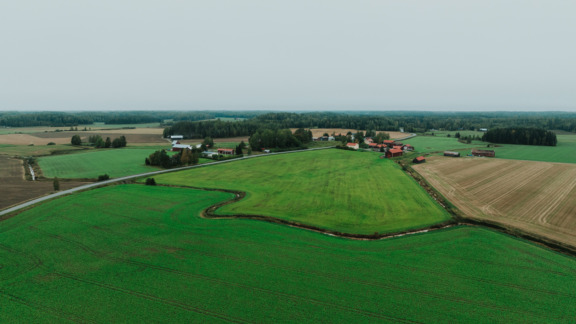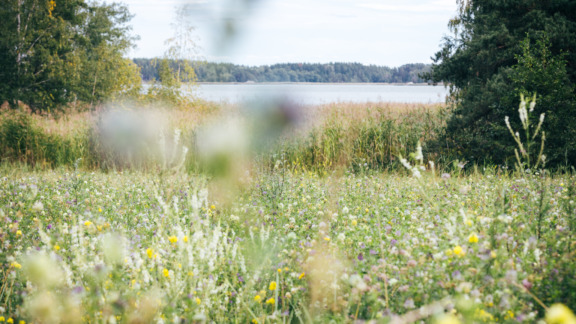Nature-based solutions are now of interest to companies and policymakers
Carbon Action interviewed Leen Gorissen during her first-time visit to Finland. Gorissen has a PhD in biology, specializing in ecology of birds. She left her job at a prestigious research institute, retrained, and now teaches others to think sustainably.
International guests at Parainen
The Finnish EU Presidency has had events concentrated in Helsinki. However, a group of participants from the European Days for Sustainable Circular Economy (EDSCE19) seminar took a trip to Parainen to explore Qvidja’s pilot farm, which utilizes regenerative farming methods. While the EDSCE19 seminar’s main focus was on the more conventional aspects of sustainability, such as minimizing side streams, the visit to Qvidja was an in-depth dive to the world of regenerativity in line with BSAG’s operational model. Farmer Juuso Joona, Finnish Meteorological Institute’s researcher Henriikka Vekuri, and Qvidja’s co-owner and BSAG’s Chair of the Board Saara Kankaanrinta introduced the visitors to the farm together. The composition of the trio embodied the philosophy behind Carbon Action: bold experimentation, collaboration, and top research brought together.
Qvidja as a pioneer
“I must admit that I am really impressed. There are not many people in the world who have already changed their way of thinking in a necessary way”, says Gorissen of Carbon Action.
Regenerativity is in the center of both Gorissen’s thinking and Carbon Action’s work. Contemporary human activity is rarely regenerative, whereas nature, or more precisely life, works regeneratively. The basic principle of regenerativity is to leave things in a better condition than we found them. Carbon Action puts this into practice with farming methods that take care of the soil and its microbes, leaving the soil in a better condition. This also helps the soil to sequester carbon.

Solution lies in combining biology and technology
Gorissen talks a lot about innovation but calls for a fresher, far-reaching perspecitve: “The world is not a machine, but a living system”. Technology should utilize biology but the two fields are separated from each other. Technological solutions developed by humans are often taken in on blind faith even though evolution would already have provided better solutions to the problems.
It is also important to think about the consequences of innovations, instead of focusing only on the innovations themselves. Redefining innovations is linked with the regenerativity of nature. According to Gorissen, the by-products and purpose should be taken into account when making new innovations: “We create new technologies without thinking about their side-effects. We don’t examine whether they improve our lives or do the opposite.”
Gorissen encourages to look for inspiration in nature. She believes nature has already found solutions to the problems we face, and it has done it in a way that sustains life and improves it in the long run.
The business world is evolving rapidly – whether or not we want it to
Gorissen appreciates the importance of science in finding solutions but believes that the big change will come from companies with the influence and wealth that is needed for change. The main reason for her switching over to the business world, however, was her frustration with the slowness of the academic writing process and peer-reviews. “I love science, it´s my passion. But solving the sustainability crisis is so pressing that the science community cannot focus solely on writing articles”, she stresses.
She believes that companies are the biggest contributors to change: “Business world has luckily also become aware of the urgency of climate action. Companies are noticing how the entire business ecosystem is changing so rapidly that we cannot think about innovations the way we have been thinking about them before.” Now is the right time for change and Gorissen trusts Carbon Action to be one of the forerunners leading the way for others.
Gorissen believes that regenerativity, which Carbon Action also researches and implements, will be essential for the future. We must view food production on the systemic level. For example, regenerativity also improves chances to survive in extreme weather conditions, which in the recent years have begun to afflict farmers. Gorissen thinks that Carbon Action is especially important, since there can be no sustainability without regenerativity: “Truly understanding life sheds light to the fact that sustainability is actually a byproduct of regenerativity”, she declares.
The visit to Qvidja was organized as part of the European Days for Sustainable Circular Economy conference. The international conference was part of Finland’s EU presidency programme. Leen Gorissen is an expert on regenerative thinking and has founded the Studio Transitio for facilitating transition processes.
Veera Lyytikäinen / Universo



